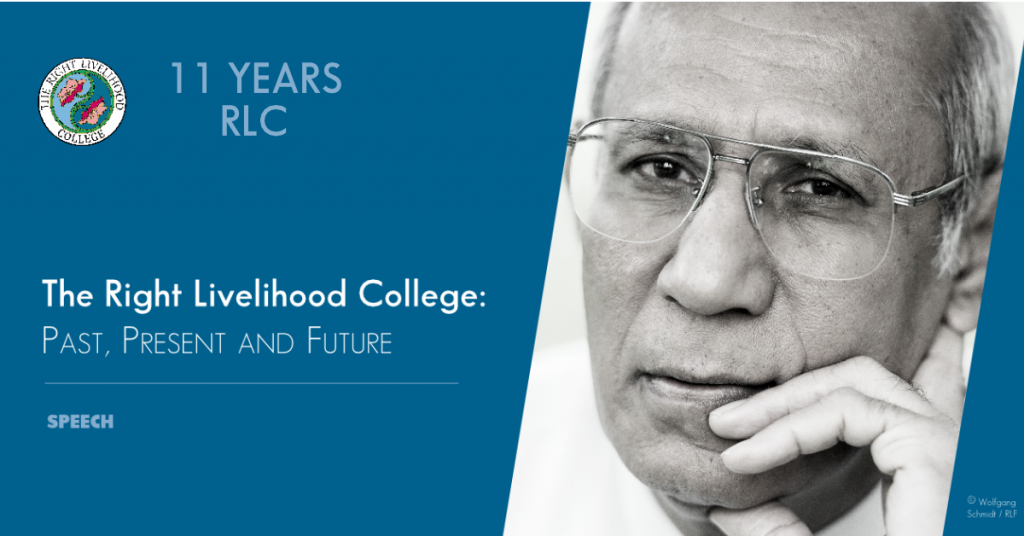
On Friday, January 8, 2021, the Right Livelihood College (RLC) celebrated its 11th Anniversary with a festive online ceremony, not only to congratulate the RLC on its birthday, but also to celebrate the beginning of a new phase in the history of the RLC.
Watch below the speech of Anwar Fazal, Right Livelihood Award Laureate of 1982, and founder and Co-chair of the International Advisory Council of the RLC Network.
A transcript of the speech is available below.
Dear Citizens of the Universe,
Dear Children of Mother Earth,
Dear Brothers and Sisters,
The beginnings of any movement are important to remember. The idea of the Right Livelihood College (RLC) is a fascinating journey. It was an idea from the Right Livelihood laureates, consisting of the laureates and was a platform for them to advance “The Right Livelihood Way” on issues of equity, justice and peace with ourselves, others and Mother Earth.
It was to foster links between activism and academia, to nurture youth for the future, and to sprout changemakers and thinkers.
It was to get activists and academia to reach out, touch lives and make a difference, the Right Livelihood Way.
It was to take up the challenges that Mahatma Gandhi called the “7 Sins against Humanity”:
- Politics without Principles
- Wealth without Work
- Enjoyment without Conscience
- Knowledge without Character
- Business without Morality
- Science without Humanity
- Religion without Compassion
In my own journey in activism and academia, I expanded them to include four more sins;
- Rights without Responsibilities
- Power without Accountability
- Development without Sustainability
- Laws without Justice
Today, 8th January 2021, is the 11th anniversary of the Right Livelihood College (RLC) and I urge you to reflect on these “11 Sins against Humanity”.
The Birth of the Right Livelihood College
Inspiring, Informing and sharing have been central to the Right Livelihood Award. Strengthening this element was a constant and the first deep discussions were held at Salzburg, Austria, at the 25th Anniversary Conference of the Award in 2005. The idea of developing an institution of higher learning emerged in a special a group discussion there. Coincidentally, there was a young man present who had just joined the Right Livelihood Foundation (RLF) as a staff to boost its outreach and who became intensively involved in the founding and its growth. His name was Ole von Uexküll, now director of the RLF and a central supporter of the RLC.
The Right Livelihood Foundation moved quickly to explore ideas for an RLF institution of higher learning and had developed an excellent exploratory document written by an amazing young man, Mr Bijan Kafi from Egypt. Funding and management were really difficult issues and the idea continued to be explored for several years without success.
In 2009, sheer serendipity (a word that means a wonderful thing happened that was never expected) took place. Ole von Uexküll and a filmmaker were passing through the Kuala Lumpur International Airport in Malaysia in 2008 and we arranged to meet there and explore ideas. I flew from Penang to meet them, hired a taxi and take them for a tour of a spectacular new administrative capital of Malaysia, Putrajaya. We saw some amazing buildings, the restored wetland lakes and the spectacular Mosque. And then we chatted over a meal and I spoke of a completely new capacity building global initiative I was exploring called the Multiversity Enterprise. I shared my years of creating networks and also network of networks, institutional love affairs rather than marriages, building partnerships using each other’s strengths and that movements will only move in the ling range if you nurture future leadership. I was exploring in a novel light, participatory, action-oriented way. I never forgot what Ralph Nader, the renowned American public interest activist, shared with me once, decades ago (I met him first in 1972 while I was on an Eisenhower Fellowship in the USA). He said that true leadership was not about getting more “followers”, but creating more leaders. I made that, being trained in management and education, a cardinal principle in my activism work. We thought it could be a wonderful model for the Right Livelihood College.
The First Location – Penang, Malaysia
Our core asset was the amazing “faculty” of laureates as we had the power of great inspirational changemakers that can make a better world. I told him of the Universiti Sains Malaysia (USM) in Penang, Malaysia, which was being led by an academic/activist, a “Think outside the box” Vice Chancellor, Prof. Dzulkifli Razak, a global visionary. He had earlier already asked me to take up a professorial Chair at the University, which I had declined as I wanted to be a free wanderer/doer for a while. I said he would love hosting the inaugural hub of the initiative and I would be happy to lead its inception.
Ole liked the idea of this model. Prof Dzulkifli was thrilled with the idea. When Ole reported to the RLF board, there was excitement too and some un-believability that it could happen so quickly and amazingly, filling all our goals.
It was again sheer serendipity that Prof. Dzul was in Europe and in Berlin and we arranged for him to meet Jakob von Uexkull, the founder of the RLF to assure him that he will give the RLC a home and every support needed for this exciting venture. I asked that a photo be taken of them shaking hands as an agreement and to be sent to me as evidence. The moment I got it, I said I would start work immediately on the detailed framework, its working principles that included the range of activities expected, and its launch. In a matter of weeks, the inaugural hub of the Right Livelihood College was launched in Penang on 8 January 2009. It was based at the Centre for Policy Research and International Studies (CenPRIS) with my appointment as a Visiting Professor. We recruited Programme Officer, Sharan Srinivas, from India who specialised in International Affairs and Human Rights and who had all the qualities needed for an academic initiative; language, knowledge, globalness and passion. In the first four years, we got moving speedily in a light participatory and action-oriented way, a journey of what led to its global extension to every continent began in earnest and grew and grew over the decade in a remarkable way. I also envisaged the RLC as a dynamic, vibrant global multiverse initiative that could serve as hubs, catalysts, incubators, multipliers and accelerators of ideas and actions.
